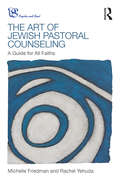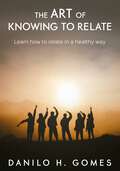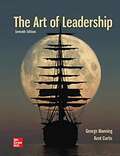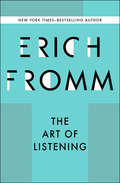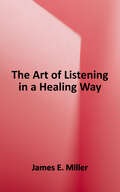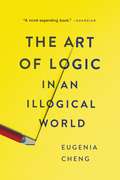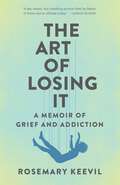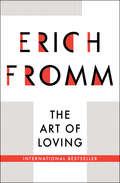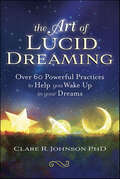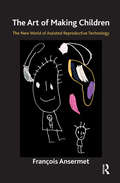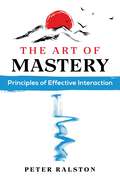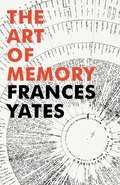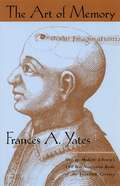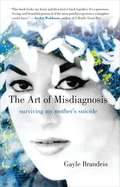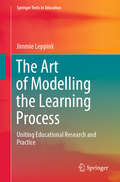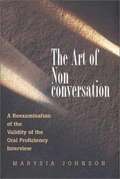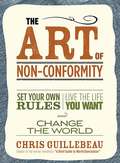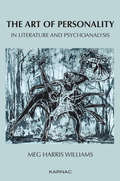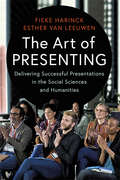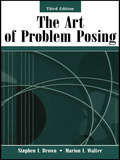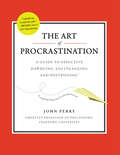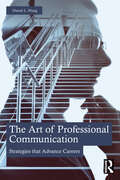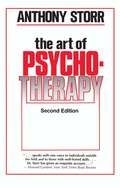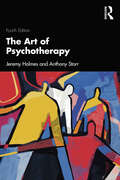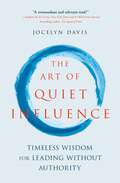- Table View
- List View
The Art of Jewish Pastoral Counseling: A Guide for All Faiths (Psyche and Soul)
by Michelle Friedman Rachel YehudaThe Art of Jewish Pastoral Counseling provides a clear, practical guide to working with congregants in a range of settings and illustrates the skills and core principles needed for effective pastoral counseling. The material is drawn from Jewish life and rabbinic pastoral counseling, but the fundamental principles in these pages apply to all faith traditions and to a wide variety of counselling relationships. Drawing on relational psychodynamic ideas but writing in a very accessible style, Friedman and Yehuda cover when, how and why counseling may be sought, how to set up sessions, conduct the work in those sessions and deal with difficult situations, maintain confidentiality, conduct groupwork and approach traumatic and emotive subjects. They guide the reader through the foundational principles and topics of pastoral counseling and illustrate the journey with accessible and lively vignettes. By using real life examples accompanied by guided questions, the authors help readers to learn practical techniques as well as gain greater self-awareness of their own strengths and vulnerabilities. With a host of examples from pastoral and clinical experience, this book will be invaluable to anyone offering counselling to both the Jewish community and those of other faiths. The Art of Jewish Pastoral Counseling will appeal to psychoanalysts, particularly those working with Jewish clients, counselors, psychotherapists, psychoanalysts and rabbis offering pastoral counseling, as well as clergy of other faiths such as ministers, priests, imams and lay chaplains.
The Art of Knowing to Relate: Learn how to relate in a healthy way
by Danilo H. GomesFrom that much of relations with the machines than with people, humans apparently lost the social skills needed to maintain good relationships. There are those who dropped to relate to and live today locked in a few cubic meters trying to live life alone. How to relate? How to maintain a relationship? With whom they relate? These and many other questions that often plague the mind of individuals around the world. This is easily understandable taking into consideration the situation in which the generations of this century. The technology brings people together in a unique way and matchless, however, excludes all the benefits that the true warmth provides. We all need to learn how to feed back and obtain quality interpersonal relationships.
The Art of Leadership
by Kent Curtis George ManningThe Art of Leadership is based on two ideas: 1. Leadership will take place to the extent the leader cares about the work to be done. Equally important, the leader must care about people. Neither of these qualities is sufficient without the other, and neither can be false. People know when the leader cares. When the leader is committed to the task and is concerned about people, these qualities serve as magnets and motivators to followers, and their potential for achievement becomes enormous. <p><p> 2. Leadership is an art that can be developed through mastery of nine key areas of success. The successful leader must possess knowledge and skills in the following areas: understanding leadership variables, the power of vision, the importance of ethics, the empowerment of people, leadership principles, understanding people, multiplying effectiveness, developing others, and performance management. <p><p>The difference between most other leadership texts and the Art of Leadership can be compared to the difference between a lecture and seminar. Although both are good educational vehicles, the lecture is better for conveying large amounts of information, while the seminar is better for developing skills and attitudes. A good lecture is interesting and builds knowledge, while a good seminar is stimulating and builds competency. Without sacrificing either theoretical foundation or important content, the 6th edition of The Art of Leadership emphasizes the interactive, seminar approach to learning. <p><p>The 7th edition remains reader-centered, research-based, practical, and personalized. The Instructor Resources for the 7th edition have been vastly enhanced, including the PowerPoint and test bank.
The Art of Listening
by Erich FrommThe renowned social psychologist and New York Times–bestselling author shares his insights on the process of psychotherapy, drawing on his own experience. Over the course of a distinguished career, Erich Fromm built a reputation as a talented speaker and gifted psychoanalyst—the first specialization of this polymath. The Art of Listening is a transcription of a seminar Fromm gave in 1974 to American students in Switzerland. It provides insight into Fromm&’s therapy techniques as well as his thoughts and mindset while working. In this intimate look at his profession, Fromm dismantles psychoanalysis and then reassembles it in a clear and engaging fashion. This ebook features an illustrated biography of Erich Fromm including rare images and never-before-seen documents from the author&’s estate.
The Art of Listening in a Healing Way
by James E. MillerThe Art of Listening in a Healing Way is Jim Miller's sequel to his popular book, "The Art of Being a Healing Presence." He describes what healing listening is and how it differs from other kinds of listening. Then 27 short chapters provide helpful insights into how to do this special kind of listening. Examples: "A healing listener listens with the eyes." "A healing listener cleaves to silence." Interspersed throughout are intriguing quotations from the ages, as well as the author's floral photography.
The Art of Logic in an Illogical World: The Art Of Logic In An Illogical World
by Eugenia ChengHow both logical and emotional reasoning can help us live better in our post-truth worldIn a world where fake news stories change election outcomes, has rationality become futile? In The Art of Logic in an Illogical World, Eugenia Cheng throws a lifeline to readers drowning in the illogic of contemporary life. Cheng is a mathematician, so she knows how to make an airtight argument. But even for her, logic sometimes falls prey to emotion, which is why she still fears flying and eats more cookies than she should. If a mathematician can't be logical, what are we to do? In this book, Cheng reveals the inner workings and limitations of logic, and explains why alogic--for example, emotion--is vital to how we think and communicate. Cheng shows us how to use logic and alogic together to navigate a world awash in bigotry, mansplaining, and manipulative memes. Insightful, useful, and funny, this essential book is for anyone who wants to think more clearly.
The Art of Losing It: A Memoir of Grief and Addiction
by Rosemary KeevilWhen her brother dies of AIDS and her husband dies of cancer in the same year, Rosemary is left on her own with two young daughters and antsy addiction demons dancing in her head. This is the nucleus of The Art of Losing It a young mother jerking from emergency to emergency as the men in her life drop dead around her; a high-functioning radio show host waging war with her addictions while trying to raise her two little girls who just lost their daddy; and finally, a stint in rehab and sobriety that ushers in a fresh brand of chaos instead of the tranquility her family so desperately needs.Heartrending but ultimately hopeful, The Art of Losing It is the story of a struggling mother who finds her way—slowly, painfully—from one side of grief and addiction to the other.
The Art of Loving (Classics Of Personal Development Ser.)
by Erich FrommThe landmark bestseller that changed the way we think about love: &“Every line is packed with common sense, compassion, and realism&” (Fortune). The Art of Loving is a rich and detailed guide to love—an achievement reached through maturity, practice, concentration, and courage. In the decades since the book&’s release, its words and lessons continue to resonate. Erich Fromm, a celebrated psychoanalyst and social psychologist, clearly and sincerely encourages the development of our capacity for and understanding of love in all of its facets. He discusses the familiar yet misunderstood romantic love, the all-encompassing brotherly love, spiritual love, and many more. A challenge to traditional Western notions of love, The Art of Loving is a modern classic about taking care of ourselves through relationships with others by the New York Times–bestselling author of To Have or To Be? and Escape from Freedom. This ebook features an illustrated biography of Erich Fromm including rare images and never-before-seen documents from the author&’s estate.
The Art of Lucid Dreaming: Over 60 Powerful Practices to Help you Wake Up in your Dreams
by Clare R. JohnsonLearn how to wake up in your dreams for creative insights and beautiful spiritual adventuresThe Art of Lucid Dreaming is a quick and easy guide to help you get lucid fast. Dr. Clare Johnson, world-leading expert on lucid dreaming, shares her best practical tips and a unique Lucidity Quiz that identifies your personal sleeper-dreamer type so you can fast-track to the techniques that work best for you. When you are lucid in a dream, you can choose to ask your unconscious mind for guidance, perform healing magic, seek creative solutions to problems, and explore the dream realm more profoundly than ever before.With over sixty practices and fifteen tailor-made lucidity programs to get you started, this hands-on guide helps you set up your own custom program for achieving lucidity as quickly as possible. Focusing on how to get lucid, stay lucid, and guide your dreams, this book shows how to transform your nightly slumber into an exciting spiritual adventure that fills your life with meaning.
The Art of Making Children: The New World of Assisted Reproductive Technology
by Francois AnsermetThis book explores the issues that surround medically assisted reproduction. It addresses the place of destiny, including how to think about individual destinies in an age of increasingly accessible gene sequencing paired with a growing link between procreation and prediction.
The Art of Mastery: Principles of Effective Interaction
by Peter RalstonA detailed guide to what it takes to master anything• Explores in depth the foundational skills and operating principles that empower mastery, including accurate perceptive awareness and effective interaction• Looks at how to control your mind and transform your perceptive experience so what you are experiencing aligns with what&’s actually occurring• Presents a step-by-step breakdown of the principle of effective interaction and explains how to overcome the major obstacles to masteryBecoming a master in a particular area is not tied solely to innate ability or talent nor to years of rote practice. As martial arts master and consciousness explorer Peter Ralston explains, the secret to mastery lies in accurate perceptive-awareness and effective interaction.In this detailed guide to what it takes to master something, Ralston examines the powerful dynamics behind the art of mastery. He explores the foundational skills and operating principles that empower mastery, including the principle of effective interaction, the mind-body alignment principle, and creative intelligence. Examining &“reaction&” versus &“response,&” he looks at how to control your mind and transform your perceptive- awareness so that what you are experiencing aligns with what&’s actually occurring—the first step toward reaching your objectives. Sharing methods to overcome the major obstacles to mastery, he presents a step-by-step breakdown of the principle of effective interaction and explains how to adapt when the people or objects you&’re interacting with are working contrary to your goals, including in sports, business, warfare, politics, or any arena in which you&’ve committed to pursuing mastery. Revealing the elements that lead to masterful interactive skills, this guide shows how to do the work of personal transformation necessary to access mastery as a real, functional experience, providing an opportunity for deeper insights into yourself and life.
The Art of Memory
by Frances A YatesThis unique and brilliant book is a history of human knowledge. Before the invention of printing, a trained memory was of vital importance. Based on a technique of impressing 'places' and 'images' on the mind, the ancient Greeks created an elaborate memory system which in turn was inherited by the Romans and passed into the European tradition, to be revived, in occult form, during the Renaissance. Frances Yates sheds light on Dante’s Divine Comedy, the form of the Shakespearian theatre and the history of ancient architecture; The Art of Memory is an invaluable contribution to aesthetics and psychology, and to the history of philosophy, of science and of literature.
The Art of Memory
by Frances A. YatesIn this classic study of how people learned to retain vast stores of knowledge before the invention of the printed page, Frances A. Yates traces "The Art of Memory" from its treatment by Greek orators, through its Gothic transformations in the Middle Ages, to the occult forms it took in the Renaissance, and finally to its use in the seventeenth century. This book, the first to relate the art of memory to the history of culture as a whole, was revolutionary when it first appeared and continues to mesmerize readers with its lucid and revelatory insights.
The Art of Misdiagnosis: Surviving My Mother's Suicide
by Gayle Brandeis<P>Award-winning novelist and poet Gayle Brandeis’s wrenching memoir of her complicated family history and her mother’s suicide. <P>Gayle Brandeis’s mother disappeared just after Gayle gave birth to her youngest child. Several days later, her body was found: she had hanged herself in the utility closet of a Pasadena parking garage. In this searing, formally inventive memoir, Gayle describes the dissonance between being a new mother, a sweet-smelling infant at her chest, and a grieving daughter trying to piece together what happened, who her mother was, and all she had and hadn’t understood about her. <P>Around the time of her suicide, Gayle’s mother had been working on a documentary about the rare illnesses she thought ravaged her family: porphyria and Ehlers-Danlos syndrome. <P> In The Art of Misdiagnosis, taking its title from her mother’s documentary, Gayle braids together her own narration of the charged weeks surrounding her mother’s suicide, transcripts of her mother’s documentary, research into delusional and factitious disorders, and Gayle’s own experience with misdiagnosis and illness (both fabricated and real). <P>Slowly and expertly, The Art of Misdiagnosis peels back the complicated layers of deception and complicity, of physical and mental illness in Gayle’s family, to show how she and her mother had misdiagnosed one another. <P>Gayle’s memoir is both a compelling search into the mystery of one’s own family and a life-affirming story of the relief discovered through breaking familial and personal silences. <P>Written by a gifted stylist, The Art of Misdiagnosis delves into the tangled mysteries of disease, mental illness, and suicide and comes out the other side with grace.
The Art of Modelling the Learning Process: Uniting Educational Research and Practice (Springer Texts in Education)
by Jimmie LeppinkBy uniting key concepts and methods from education, psychology, statistics, econometrics, medicine, language, and forensic science, this textbook provides an interdisciplinary methodological approach to study human learning processes longitudinally. This longitudinal approach can help to acquire a better understanding of learning processes, can inform both future learning and the revision of educational content and formats, and may help to foster self-regulated learning skills. The initial section of this textbook focuses on different types of research questions as well as practice-driven questions that may refer to groups or to individual learners. This is followed by a discussion of different types of outcome variables in educational research and practice, such as pass/fail and other dichotomies, multi-category nominal choices, ordered performance categories, and different types of quantifiable (i.e., interval or ratio level of measurement) variables. For each of these types of outcome variables, single-measurement and repeated-measurements scenarios are offered with clear examples. The book then introduces cross-sectional and longitudinal interdependence of learning-related variables through emerging network-analytic methods and in the final part the learned concepts are applied to different types of studies involving time series. The book concludes with some general guidelines to give direction to future (united) educational research and practice. This textbook is a must-have for all applied researchers, teachers and practitioners interested in (the teaching of) human learning, instructional design, assessment, life-long learning or applications of concepts and methods commonly encountered in fields such as econometrics, psychology, and sociology to educational research and practice.
The Art of Non-Conversation: A Re-examination of the Validity of the Oral Proficiency Interview
by Marysia JohnsonThe purpose of this book is to provide answers to two fundamental questions. The first is a practical one, and it represents the main focus of the book: Is the Oral Proficiency Interview a valid instrument for assessing language speaking proficiency? The second is a theoretical one: What is speaking ability? (that is, speaking ability that exists independently of testing instruments).
The Art of Non-conformity: Set Your Own Rules, Live the Life You Want, and Change the World
by Chris GuillebeauIf you've ever thought, 'There must be more to life than this,' The Art of Non-Conformity is for you. Based on Chris Guillebeau's popular online manifesto 'A Brief Guide to World Domination,' The Art of Non-Conformity defies common assumptions about life and work while arming you with the tools to live differently. You'll discover how to live on your own terms by exploring creative self-employment, radical goal-setting, contrarian travel, and embracing life as a constant adventure. Inspired and guided by Chris's own story and those of others who have pursued unconventional lives, you can devise your own plan for world domination-and make the world a better place at the same time.
The Art of Personality in Literature and Psychoanalysis
by Meg Harris WilliamsThe Art of Personality is a diverse selection of talks and papers on psychoanalysis and literature given by the author over the past ten years. They elaborate on the goal expressed by Milton as 'becoming a true poem': that is, seeing parallels between the gradual construction of the personality and the construction of a work of art, following an internal evolution on the lines of Bion's description of an 'endoskeletonous personality'. The works discussed range from classic Greek drama to Dostoevsky, Kafka, and Patrick White. The author's thoughts on our interaction with literature stand alongside those of Adrian Stokes and Richard Wollheim on understanding paintings. She brings together a broad knowledge of ancient and modern writings with a deep understanding of the creatively imaginative mind, illuminated by post-Kleinian psychoanalysis. This book will be a source of pleasure and inspiration both to general lovers of literature and to psychoanalytic workers who value the poetic aspects of their patients and their own forms of expression.'
The Art of Presenting: Delivering Successful Presentations in the Social Sciences and Humanities
by Fieke Harinck Esther van LeeuwenDelivering professional presentations of scientific work is an important part of an academic's life. Oral presentations are important not only because you present your scientific work, but also because you present yourself to potential hiring committees, grant committees, and collaborators. This book uses insights from the field of psychology, as well as from the theatre, to teach you how to make a lasting impression. It addresses core topics such as how to design presentation slides, how to practice, and how to deliver your presentation to a range of audiences. Useful exercises are provided to help you cope with presentation anxiety, make the most out of conferences, and adapt your presentation to various formats, audiences, and cultures. It is not easy to present with impact, but this book contains the guidance you need to master the art of presenting.
The Art of Problem Posing
by Stephen I. Brown Marion I. WalterThe new edition of this classic book describes and provides a myriad of examples of the relationships between problem posing and problem solving, and explores the educational potential of integrating these two activities in classrooms at all levels. The Art of Problem Posing, Third Edition encourages readers to shift their thinking about problem posing (such as where problems come from, what to do with them, and the like) from the "other" to themselves and offers a broader conception of what can be done with problems. Special features include: an exploration of the logical relationship between problem posing and problem solving; sketches, drawings, and diagrams that illustrate the schemes proposed; and a special section on writing in mathematics.In the updated third edition, the authors specifically:*address the role of problem posing in the NCTM Standards;*elaborate on the concept of student as author and critic;*include discussion of computer applications to illustrate the potential of technology to enhance problem posing in the classroom;*expand the section on diversity/multiculturalism; and*broaden discussion of writing as a classroom enterprise.This book offers present and future teachers at the middle school, secondary school, and higher education levels ideas to enrich their teaching and suggestions for how to incorporate problem posing into a standard mathematics curriculum.
The Art of Procrastination: A Guide to Effective Dawdling, Lollygagging and Postponing
by John PerryThis is not a book for Bill Gates. Or Hillary Clinton, or Steven Spielberg. Clearly they have no trouble getting stuff done. For the great majority of us, though, what a comfort to discover that we’re not wastrels and slackers, but doers . . . in our own way. It may sound counterintuitive, but according to philosopher John Perry, you can accomplish a lot by putting things off. He calls it “structured procrastination”:In 1995, while not working on some project I should have been working on, I began to feel rotten about myself. But then I noticed something. On the whole, I had a reputation as a person who got a lot done and made a reasonable contribution. . . . A paradox. Rather than getting to work on my important projects, I began to think about this conundrum. I realized thatI was what I call a structured procrastinator: a person who gets a lot done by not doing other things.Celebrating a nearly universal character flaw, The Art of Procrastination is a wise, charming, compulsively readable book—really, a tongue-in-cheek argument of ideas. Perry offers ingenious strategies, like the defensive to-do list (“1. Learn Chinese . . .”) and task triage. He discusses the double-edged relationship between the computer and procrastination—on the one hand, it allows the procrastinator to fire off a letter or paper at the last possible minute; on the other, it’s a dangerous time suck (Perry counters this by never surfing until he’s already hungry for lunch). Or what may be procrastination’s greatest gift: the chance to accomplish surprising, wonderful things by not sticking to a rigid schedule. For example, Perry wrote this book by avoiding the work he was supposed to be doing—grading papers and evaluating dissertation ideas. How lucky for us.
The Art of Professional Communication: Strategies that Advance Careers
by Daniel PlungGoing beyond the mechanics of professional communication, this book combines insights into the overlooked implicit demands of corporate communication challenges with the proven strategies and techniques that distinguish professionals as capable communicators and candidates for promotion.The practical strategies offered in this book represent professional communication principles filtered through the lens of the author’s 40-year career, that enabled him to rise from an initial assignment as a technical editor to positions of senior management directing large, diverse business and technical organizations. Here, he has collected into one resource the reasoned and disciplined decision-making processes, tools, and techniques essential to craft communications, precisely attuned to the explicit and implicit expectations of each assignment and supported by a structure and presentation logic that delivers a totally responsive and accurately targeted product. This is an essential guide for all levels of professionals who recognize the need to distinguish themselves within a highly competitive career environment.Business professionals and instructors in corporate training programs, supervisors and managers, and students in professional communication programs will welcome this deep dive into the real-world challenges and opportunities in professional communication and the role effective communication plays in career advancement.
The Art of Psychotherapy
by Anthony StorrAnthony Storr's accessible and humane account of the art of psychotherapy has been widely read by practitioners in training and others in the helping professions, as well as many general readers. The second edition includes a thoroughly revised account of the obsessional personality, and a new chapter that draws on the author's recent work on the importance of the processes of healing that take place within the isolated individual.
The Art of Psychotherapy
by Anthony Storr Jeremy HolmesStorr’s The Art of Psychotherapy first appeared in 1979 and became an instant classic. After Storr’s death, a third edition was rewritten and revised by Jeremy Holmes, and this fourth edition is a further up-to-date iteration. Storr (1920–2001) and Holmes, both medical psychoanalytic psychotherapists, are ‘elders’ in the world of psychotherapy. Their eclectic, experienced and cultured voices offer students and psychotherapy practitioners clinical wisdom hard to find elsewhere. Their book expounds in a very practical way the issues entailed in setting up and maintaining a psychotherapeutic relationship and practice: how to introduce oneself, arrange one’s consulting room, establish a contract, when and how to make ‘interpretations'. The second half of the book deals with more general and often problematic issues, including how to align therapy in the light of diagnosis, working with ‘difficult’ patients, therapy termination, and the life course of a therapist, ending with a valedictory overview. In this fourth edition, Holmes has added a chapter on the scientific validation of psychotherapy, sections on tele- and e-therapy, non-binary gender and sexual identities and the impact of race and class on the therapeutic relationship. This engaging, accessible and profound book is essential reading for psychotherapists, counsellors, psychiatrists and mental health practitioners in training or practice.
The Art of Quiet Influence: Timeless Wisdom for Leading Without Authority
by Jocelyn DavisInfluence is getting things done without coercion. It's strength without force-mindfulness in action. Master influencers walk lightly, talk softly and have no need of a big stick, yet collective success hinges on their words and deeds.Anyone can be a quiet influencer. Featuring twelve specific practices, twelve typical pitfalls and dozens of powerful stories and examples, The Art of Quiet Influence is a roadmap for the journey. Author Jocelyn Davis weaves together the timeless wisdom of Eastern thinkers-from Confucius to the Buddha, from Rumi to Gandhi-with research and insights from modern-day experts, revealing what's wrong with the Western view of influence as short-term persuasion and showing instead how to create trust-based collaborations with lasting impact.
